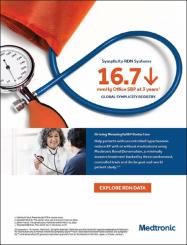Increased Transforming Growth Factor- Levels Associated With Cardiac Adverse Events in Hypertrophic Cardiomyopathy

View/
Date
2015Author
Ayca, BurakŞahin, İrfan
Küçük, Suat Hayri
Akın, Fatih
Kafadar, Didem
Avşar, Murat
Dinçkal, Mustafa Hakan
Metadata
Show full item recordAbstract
BackgroundHypertrophic cardiomyopathy (HCM) is a common genetic heart disease characterized by ventricular hypertrophy, myocardial fibrosis, and impaired ventricular relaxation. The exact mechanisms by which fibrosis is caused remain unknown. HypothesisCirculating TGF- is related to poor prognosis in HCM. MethodsWe compared TGF- levels of 49 HCM patients with those of 40 non-HCM patients. We followed the patients with HCM for 18 months and divided them into 2 groups: low TGF- (4877 pg/mL) and high TGF- (>4877 pg/mL). We compared the 2 groups in terms of brain natriuretic peptide (BNP), echocardiographic parameters, and clinical outcomes including myocardial infarction, arrhythmias, implantable cardioverter-defibrillator implantation, hospitalization, New York Heart Association (NYHA) class, acute heart failure, and mortality. ResultsThe HCM patients had higher TGF- levels than those in the control group (P = 0.005). In the follow-up, those in the high TGF- group had higher BNP levels, larger left-atrial size, thicker interventricular septum, NYHA class, more hospitalizations, and a greater number of clinical adverse events (P < 0.001, P = 0.01, P < 0.001, P = 0.002, P < 0.001 and P = 0.003, respectively). TGF- level of >4877 pg/mL can predict adverse events with a specificity of 75% and a sensitivity of 72% (P = 0.014). In multivariate regression analysis, TGF-, BNP, and interventricular septum thickness were significantly associated with adverse events (P = 0.028, P = 0.030, and P = 0.034, respectively). ConclusionsThe TGF- level is higher in HCM patients and associated with a poor prognosis in HCM.

















